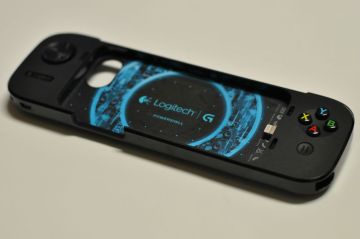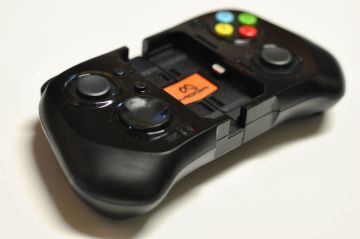Do not go out and buy an iPhone game controller right now, because the experience isn’t good enough yet.
But give it a year or two, and pairing a game controller with an iPhone or iPad won’t be all that different from having a PlayStation Vita or Nintendo 3DS in your pocket.
As a games platform, the iPhone is growing up with the launch of controller support in Apple‘s iOS 7, along with the first two official iPhone game controllers from Moga and Logitech. These controllers allow you to play games like Limbo, Bastion and Grand Theft Auto: San Andreas as originally intended, with thumbsticks, buttons and triggers.
That’s the idea, at least. I’ve been playing with both the Logitech PowerShell and Moga Ace Power–each priced at $100–for a few weeks, and it’s hard to recommend either controller due to their subpar designs, limited game support and lack of commitment from Apple. But these are just baby steps toward what should be a bright future for console-quality gaming on smartphones and tablets.
Game controllers for the iPhone and iPad have been around for a while, so what makes the Moga Ace Power and Logitech PowerShell “official?” Both companies adhered to Apple’s guidelines, determining the shape of the controllers and the number of buttons they have. Developers can then add controller support to their games, knowing the hardware will work. (On Android, a number of competing controllers and no help from Google make for a messier situation.)
The list of supported games is small for now–you’ll find maybe 50 games that work with either controller–but the list is growing. Over the last few weeks, some notable games have added controller support: Tomb Raider, Riptide GP 2, Asphalt 8: Airborne and Sonic the Hedgehog 2.
Unfortunately, Apple makes it nearly impossible to find these games, with no “controller-supported” section within the App Store or GameCenter. Logitech and Moga aren’t helping, as neither company provides a complete list of supported games. (Logitech wrote a blog post that lists a few dozen games, but it’s already out of date.) After spending $99 for one of these controllers, you’re on your own. It’s a major problem.
The kiss of death comes from the controllers themselves, neither of which feel like they’re worth $100.
Moga has made some great Android controllers recently, but the Ace Power is a step backward, with analog nubs instead of proper thumbsticks, and a cheap plastic shell that has none of the design flourishes of Moga’s Android controllers.

Logitech’s PowerShell feels a little classier, with textured grips and a svelte design, but its lack of dual thumbsticks and secondary rear triggers puts it at a functional disadvantage compared to the Moga Ace Power.
Worst of all, on both controllers I had issues with certain buttons not registering unless I pressed down pretty hard.
We’ve seen Moga iterate quickly on flawed designs before; hopefully both companies can release new and improved hardware soon.
Big Opportunity
Despite all these problems, I’m still optimistic about iOS game controllers, especially after speaking with executives from Moga and Sega.
“We don’t see this as a passing fad. We actually have pretty lofty, elephant-sized goals that we’re shooting for,” Rob Martin, Moga’s chief marketing officer, said in an interview.

By the end of next year, Moga hopes to have 1,500 games with controller support on iOS, and 1,000 games on Android. And within a few years, Moga thinks more people will use game controllers with mobile devices than with consoles.
Martin pointed out that 966 million people play mobile games according to a recent study, so it’s “simple mathematics” that a fraction of those users could pick up a controller and overtake console gaming.
Hardcore gamers might scoff at that idea, given the prevalence of lightweight, free-to-play games on phones and tablets. But deeper games such as Bastion, Limbo and XCOM are starting to disprove the stereotype that there’s a lack of meatier fare. Over the next few years, the performance gap between mobile and console games should continue to shrink, especially with Apple’s move to 64-bit architecture in iOS7. Moga has already observed that when people connect a game controller, they tend to play longer, suggesting that controllers could help mobile games become less snack-like.
“It’s really early days, and the types of experiences that are available now are just the beginning,” said Chris Olson, Sega’s vice president of digital business.
Over time, Martin thinks Apple will make controller-based games easier to find. “I think that they are completely aware of search and discoverability, and are working hard to make that a better experience for the consumer, and it’s going to continue to improve into the holidays and in 2014.”
Sega’s Olson agreed. “If Apple’s taking the time to push it into their own channel and roll it up into iOS, to me it’s a no-brainer that they would have bigger, longer-term plans to either promote it or extend it,” he said.
So what’s next, beyond more games and better ways to find them? Moga’s Martin hinted at controllers that support Apple’s iPad, not just the iPhone and iPod Touch. Both Martin and Olson speculated that Apple might want to take iOS games into the living room, something that’s already possible through AirPlay streaming, but could be improved upon. “If I were a betting man, that’s where I would go,” Olson said.
Several months back, I wrote that Apple has the makings of a great gaming system. I still believe it, but now we know just how much work still needs to be done.

